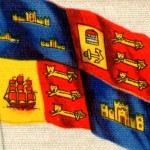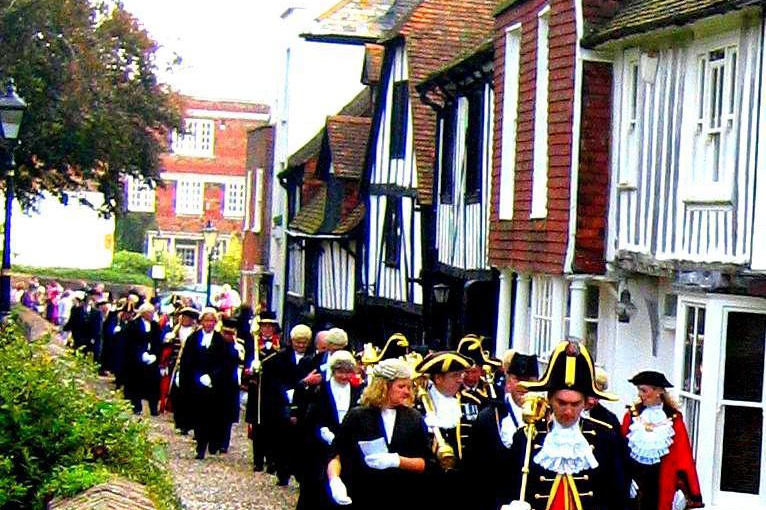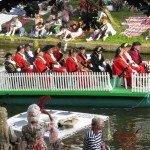By Christopher Davson
Reproduced from a “Rye’s Own” article of 1973
Westminster prides itself on its nickname the “Mother of Parliaments” — not because it was the first democratic assembly (even the Greeks had a word for that!) but because that Parliament which Simon de Montfort, Earl of Leicester, and victor of the battle of Lewes summoned at Westminster in 1265, including elected representatives, has not only continued ever since at Westminster but has formed the pattern for so many assemblies overseas.
On 12th October, 1973 an even older parliament which nevertheless has many points of similarity with Westminster procedures held its meeting at Hythe — the Court Of Brotherhood and Guestling, the Cinque Ports’ very own parliament. Parliament is a device for reconciling a representative democratic assembly with a royal executive in a combined process of government. The Cinque Ports Confederation has a strong claim to be the true ancestor of this satisfactory compromise.
The Lord Warden of the Cinque Ports is a royal appointment and represents the Queen, although elected and accepted by the Court of Shepway and. Admiralty over which he presides. That court still meets from time to time (e.g. to elect a new Lord Warden) once at Shepway Cross above Lympne, now at Dover Priory. It is, in some ways, the House of Lords or the judicial committee of the Privy Council, of the Cinque Ports. But to govern their own affairs the Cinque Ports have their own assembly, the Court of Brotherhood (originally Brodhull) with its associated Court of Guestling. These courts, now combined, are the Cinque Ports’ House of Commons.
The points of resemblance with Westminster are uncanny. First, the royal. representative (the Lord Warden) is barred from this court. He has no part in it. The Speaker, the oldest speakership in the country as this year’s Speaker (1973), Councillor Capon of Hythe, mentions in his speech, presides during his year of office. The meetings take place in Church, just as the House of Commons used originally to meet in St. Stephen’s Chapel, Westminster. Below the Speaker, on the table, rests the mace, or rather in this case the Silver Oar of the Cinque Ports, and below that at a further table sit the joint solicitors to the courts just like the Clerks to the House of Commons. There is even a Hansard in the shape of the old Minute books, the White Book and the Black Book, which give a continuous record of the courts for hundreds of years. It seems that the Court of Brotherhood was functioning in late Saxon times. The Court of Guestling was perhaps reserved for the western members of the Confederation and is generally believed to take its name from, the village of Guestling where, ‘presumably’, it met. Some say however, that the Court of Brodhull was for full “brothers” and the Court of Guestling was for “guests”, perhaps the “limbs”. Early on they were combined, however, and met whenever needed to do so to transact business, the Speaker’s town being the host. Simon de Montfort was staunchly supported by the Cinque Ports where he was a welcome visitor. Indeed, after his defeat at Evesham many of his supporters found, sanctuary at Old Winchelsea where they were roughly treated by Prince Edward (later Edward 1), Simon’s nephew. It is tempting to think that de Montfort — radical political reformer that he was — had gleaned something of the mechanism by which the Cinque Ports governed themselves and that, this may have sown the seed in his mind for that greater parliament at Westminster. But this of course is mere’ supposition. Today the Cinque Ports parliament ekes out a ghostly existence since it has no SPEAKER’S DAY AT RYE 2006 Page Five remaining function — save to to struggle to preserve its few remaining privileges. Where is no real business to be transacted there will be little life in a meeting and so it was on 12th October at Hythe despite the splendid circumstances.
No longer do the Barons of the Cinque Ports carry the canopy over the head of the Sovereign at the coronation — since the disastrous day when they so nearly dropped it on King George IV. No longer do they sit at the King’s right and left hand at the Coronation Banquet, since there is nowadays no Coronation Banquet. These uniquely prestigious privileges were not withdrawn from the Cinque Ports, but the functions themselves simply died out, however Cinque Port Barons still attend the coronation and have a part to play in it.
The chief business, and cause, of the October meeting of the Brotherhood was to make representations about the effect of the Local Government Act 1972 on the Confederation. ‘After April 1974 many of the elected representatives of the original Cinque Ports and their Limbs will cease to exist, there will no longer be separate Mayors of these ports. Hythe itself will be gone, and Dover, and Romney, but Rye’s Town Mayor will still exist and Winchelsea’s Edwardian Mayor seems beyond abolition. The Confederation hope that all districts which can claim a former port or limb will apply for the necessary charters or status or trusts to enable them to appoint an officer capable of attending the Confederation. But there are many technicalities and it is uncertain how many will be successful.
So it is possible that this is the last full meeting of the Confederation of the Cinque Ports that England will ever see. Rye’s Own was very lucky to be there. For the first time in sixty years Hythe was host to a meeting of the Cinque Ports Courts of Brotherhood and Guestling, on 12th October. A sparkling autumn day saw the sumptuous procession of Mayors with Mace Bearers, Chaplains, Aldermen, and corn-barons wend their way up the steep hill to St. Leonard’s Church, Hythe, for the service and meeting. The procession was led by the Town Crier of Dover, bearing Bailiff’s silver oar of the Cinque Ports Confederation and behind him Mr. Harris, Hythe’s Sergeant at Mace, escorted the Speaker, Councillor Christopher Capon, the Solicitors, the Chaplains, distinguished guests and the four surviving Coronation Barons all in their full ceremonial dress. (Baron Butcher did not in fact walk in the procession because he is very lame but attended the ceremonies.) In the old days any freeman of the ports was a Baron, or more strictly a Corn – Baron, and the ones selected for the Coronation “canopy duty” were among the youngest and most stalwart.
Nowadays it is an honorary distinction and physical prowess is less evident. Inside a packed church, proceedings started with an impressive church service, and the sermon was preached by the Chaplain to the Lord Warden, the Right Reverend Anthony Tremlett. Bishop of Dover. The Bishop took as his text “what mean ye by this service?” — Moses’ sixty-four thousand dollar question to the Israelites. In a short model, and inspiring address he spoke of the traditions of loyalty, discipline and self-sacrifice, of service in the highest sense, which had been the original bonds and purpose of the Cinque Ports Confederation. He felt that these qualities were no less necessary today and that ceremonies such as this one could be of value in reminding people of enduring excellence.
He compared the ceremony of the Trooping of the Colour on Horse Guards Parade, which although no longer of any military significance was yet treasured and indeed reverenced by all who saw it in person or on television and which was admired by visitors from all over the world. Trooping the Colour was a symbolic act, and so was the Brotherhood at Hythe. The final hymns sung, the clergy retired. discreetly to the background, and the Speaker’s table and chair were brought out and the proceedings commenced. Speaker Capon seemed a young and lonely figure, high up in the chancel above the rest Page Six of the audience. It was interesting to think that in the crypt underneath him lay that immense and inscrutable pile of skulls and bones which legend says are the remains of the British armies of Vortimer, defeated by the Jute and Saxon invaders under Hengist and Horsa in the sixth century. The bones were found upon the beach at Hythe and carried up to the church centuries ago.
First the Speaker read from the Minutes of the meeting in 1573 when Queen Elizabeth I (on her Cinque Ports tour) made certain decrees as to procedure and established the current Standing Orders of the meeting, for example, that a member may only speak once, and there is to be no interruption. A couple of formal resolutions, one seconded by Rye’s Mayor, Dr. Vidler, and the ceremony was over and the procession frothed down the steep steps from St. Leonard’s church to the coaches for the Imperial Hotel and lunch.
.At the banquet Admiral Gladstone of the Australian High Commission brought greetings from stricken Lord Warden Sir Robert Menzies. and the Speaker replied as follows: “In my school days, I associated the name ‘Cinque Ports’ with an historic organisation of splendour without knowing much about it and never in my wildest dreams did I anticipate that I should as Speaker be responding to a Toast, so ably proposed to the Cinque Ports by Admiral Gladstone, after participating in a Meeting of the Courts of Brotherhood and Guestling some 60 years after such Courts were last held in Hythe.
I have, in more recent years. added to my knowledge of the Confederation, for in Hythe’s Archives is the oldest Cinque Port Charter in existence (dated 1278) under the seal of Edward I and also a translation of it. which sets out the immense powers and freedom granted to the Ports by the King. The Charter also refers to previous Charters granted by each King back to the reign of Edward the Confessor. Edward the Confessor and Edward I were somewhat mythical characters to me when at school, the first being, as I believed, of a pious nature and the second rather bloodthirsty in his dealings with the Scots, but, of course, the Charter brings both to reality and one cannot but feel proud to be associated with such a unique organisation, steeped in history and tradition; comprising the only confederation of towns ever in Great Britain; having deliberative and executive powers before a House of Lords or a House of Commons existed and being the forerunner of the British Navy.
The Cinque Ports have been in existence since the 11th Century at the latest and will continue as a Confederation in the future, having been expressly assured of this by Parliament in the recent Local Government Act of 1972. Parliament obviously shares the view of the Confederations Members that the Confederation is part of our country’s heritage. We are all pleased that this is so. The White and Black Books give credence to the history of the Cinque Ports, as well as Acts of Parliament and many bibliographies and writings, and it would not be possible in a short after-luncheon speech to detail this long history. However, I can say how proud the members of the Confederation are of this ancient and unique institution.
For my part. I understand I am one of only two “Speakers” in Great Britain, the other being the Speaker of the House of Commons. The office I hold differs from that of the Speaker of the House of Commons in many ways, particularly in the fact that it is an office that is held by the Mayor of each Cinque Port and Ancient Town in rotation, it being held only for a period of one year on each occasion, so those who, like Alderman Newman of Hythe, have held the office on more than one occasion have been very lucky indeed.
The office is much older than that of the Speaker of the House of Common’s and it is unpaid but I would not today wish to exchange places with him. To be fair to him, however, I understand he would not wish to exchange places with me, which is understandable when one considers the salary he receives. As from 1st April, 1974, the present ‘local government borough’ status which attaches to each member of the Confederation (except Winchelsea) will disappear, although it is understood that Hastings is to seek a new Charter. However, as those present at the Courts today will have heard, our Joint Solicitors have been very busy seeking to ensure that successor parish councils, and any other bodies that might need to be formed, can become the bases for attaching Cinque Ports status to the appropriate existing areas.
I believe that the strongly held conception in Govern- The Lord Warden and Admiral of the Cinque Ports and Constable of Dover Castle is Admiral the Lord Boyce, GCB, OBE, DL. Page Seven ment circles, whichever Government it be, that new large modern authorities will serve the people better more cheaply and more efficiently than the old and smaller authorities have done, will prove in time to be a fallacy. Many of us believe that the preservation of Great Britain’s tradition, institutions and occasional pageantry, and even its patchwork of different authorities, has in the past contributed to its greatness and I do not mind being thought a square because I cherish some of the delights of the past. I know from my visit to America on a Churchill Scholarship, how the Americans would dearly love to be able to operate many of the ancient functions and institutions and display pageantries that are not always appreciated to the full in Great Britain.” Mayor Darker of Hastings toasted the distinguished guests and the Chief Constable of Kent, Sir Dawnay Lemon, C.B.E., Q.P.M., responded in an extremely light-hearted and amusing speech. Then it was all over. But the Confederation of the Cinque Ports lives on. Comment by today’s Editor:- That report was written over 40 years ago and looking at it in retrospect it demonstrates what a far seeing man Councillor Capon was. The strongly held conception in Government circles, that large modern authorities would serve the people better, more cheaply and more efficiently than the old and smaller authorities HAS proved a fallacy.
The mountain of debt that has piled up around the larger bodies is a direct result of the Local Government Act of 1973. Too many bosses and not enough workers! Many of us still believe in the preservation of Great Britain’s tradition, institutions and occasional pageantry, and smaller, cheaper local government authorities.
Like Councillor Capon, I do not mind being thought of as out dated because I cherish some of the delights of the past. And like that Councillor of old I know from a recent visit to the United States how the Americans would still dearly love to be able to operate many of the ancient functions and institutions and display pageantry that are not always appreciated to the full in Great Britain. Forty years ago a battle raged to save the Cinque Ports – that battle was won. Perhaps now might be the time for the members of Confederation to look at ways to combine as in those days of old and help each other fight a new Battle to save our fishermen who have been virtually deprived of their livelihood by European Community legislation.
Let us combine against this stupid ruling that results in dead fish being tipped back into the sea – any fool can see that this is no way to ‘preserve the fish stocks’. Perhaps the Cinque Ports Fleet should sail again and patrol a new 12 Mile Limit!
2016 is not a Venetian Fete Year but after a long miserable winter we though readers would enjoy the colour and warmth of these two pictures from the 2013 event.
NEXT FETE Wednesday 16 August 2017 Royal Military Canal, Hythe, Kent.
“Cinque Ports” April 2016
All articles, photographs, films and drawings on this web site are World Copyright Protected. No reproduction for publication without prior arrangement. © World Copyright 2017 Cinque Ports Magazines Rye Ltd., Guinea Hall Lodge Sellindge TN25 6EG


